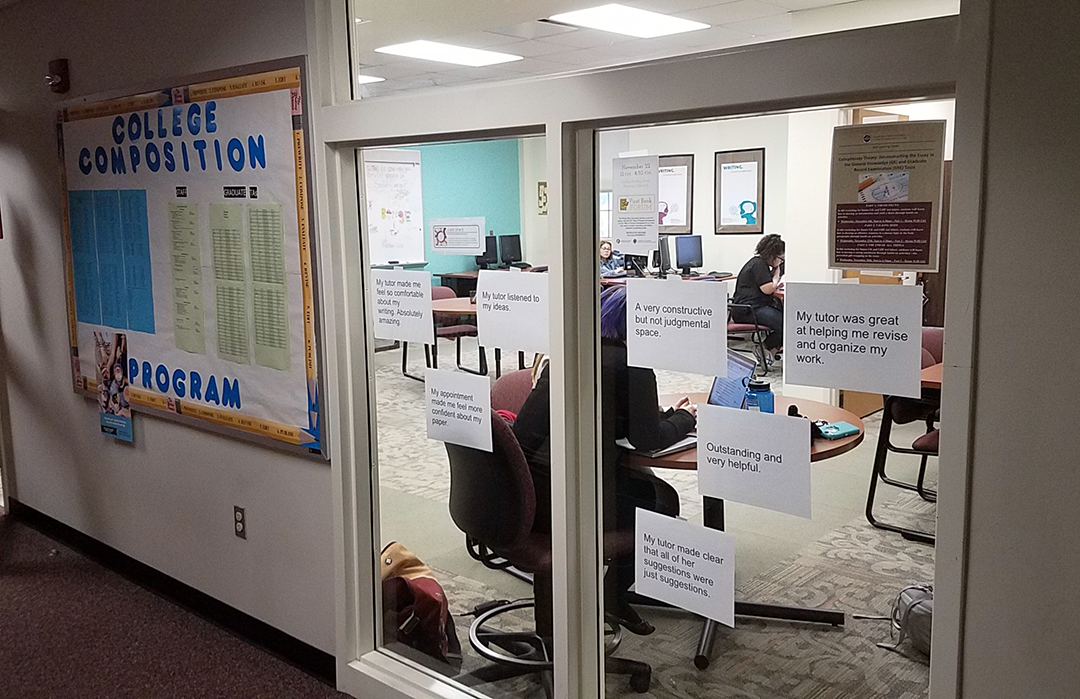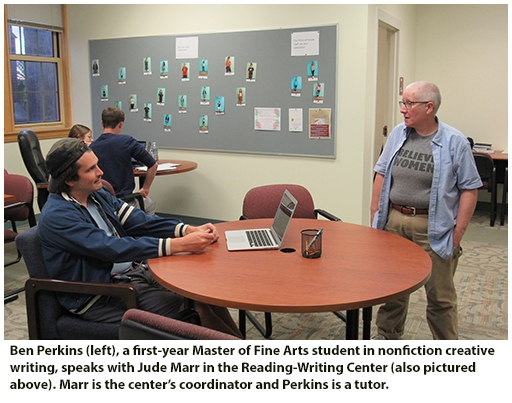FSU's Reading-Writing Center teaches students skills they can use with all classroom projects
By Emily Voytecek
Two months into their role at Florida State University as the coordinator of the Reading and Writing Center (RWC), Jude Marr is settling into the new environment.
Marr joined the RWC, located in the Williams Building, after graduating from the University of Louisiana at Lafayette with a doctorate in poetry. They bring plenty of experience to the center, as  Marr was also the assistant director of the Louisiana-Lafayette’s writing center. However, Marr’s experience extends beyond their time in Lafayette.
Marr was also the assistant director of the Louisiana-Lafayette’s writing center. However, Marr’s experience extends beyond their time in Lafayette.
“I’m a writing center person, but not perhaps, in the traditional sense because I am also a poet and I have taught literature and creative writing as well as being involved in composition, and so I’m a bit more of a generalist than writing center people sometimes are. But I think that’s a good thing,” Marr says. “The close relationship between composition, creative writing and literary studies means they needn’t be at odds with each other. If you are familiar with all of those areas you can take a more integrated approach.”
Marr has a varied academic background. They earned a Master of Fine Arts degree in creative writing in 2014 from Georgia College and a Scottish Master of Arts in English language and literature in 1983 from the University of St. Andrews. This familiarity with many types of writing helps Marr express to students one of the main goals of the RWC–helping students become better writers in general, not just with academics.
“It doesn’t have to be school work, we work with people on other projects also, we work with creative writers, we work with people on application materials…we work with graduate students, on their theses and dissertations,” Marr says. Outside of writing projects, another aspect of the RWC is the Digital Studio, where students can find help for work with multimodal projects.
The RWC tutors help students develop writing skills they can use repeatedly, as opposed to merely helping with the revisions of one particular writing project. For example, the tutors will cover issues such as “getting the material on the page and organizing it, that’s a big part of it,” Marr says.
 “But also motivational things, brainstorming, how to identify the threads that run through [papers] that become the themes that you write about, or how to be a better proofreader and editor of your own work,” they add.
“But also motivational things, brainstorming, how to identify the threads that run through [papers] that become the themes that you write about, or how to be a better proofreader and editor of your own work,” they add.
Marr stresses that all students can come by the writing center for any help on their projects. Marr believes that because the tutors at the writing center aren’t “grading anything,” students receive feedback on the quality of their work from “a more objective pair of eyes.” That process allows them to go beyond looking at just how well the work fits the standards of an assignment.
When students do need help formatting their work to fit the standards of an assignment, the RWC tutors are there to help with that stage as well. But sometimes, the needs of students extend outside the expertise of the tutors at the center. When that happens, the tutors recommend other resources available on campus to encourage students to learn the best possible ways to complete their assignments.
“[Writing projects] overlap with some other areas, like research,” Marr says. “A librarian might point out, ‘yes, you’ve found these references… but did you notice that that paper is one hundred pages long, and this one over here is 20 pages long?’”
By pairing up with other organizations, such as Strozier Library, Marr hopes that combining services will help students access all the programs available to help them succeed in their classes.
Below, Jude Marr answers a few questions about new plans they have for the RWC.
In general, what does the Reading and Writing Center do to help students?
What we really do is work with writers at all stages of the projects they’re working on, but also at all stages of their development as a writer. So, there are two things. We work with someone on whatever their current project is, and we’re always looking for what we call ‘teachable moments.’ In other words, we’re looking for something that might be related to this particular project, but also more widely to whatever else that person could be working on [related to writing projects]. Generally building confidence … part of the confidence thing is suggesting a wider context of whatever a writer is working on, to give someone permission to see themselves not only in the classroom working on a particular assignment, but more widely as a person trying to figure out how they want to write, what their process is, how they get the words on the page, how they want to express themselves on the page.
Are there student populations that are more likely to come to the RWC?
We have a lot of student-athletes who use the writing center, we have a lot of graduate students who use the writing center, international students, and students from the two first-year writing programs, 1101 and 2135. Sometimes tutors will suddenly realize they’re seeing a lot of students coming from a particular class, and it turns out that there’s one professor in particular, maybe based on past experience, who has decided that the writing center is an excellent thing. We hope to build on that.
What was your first impression of the RWC?
One of my first impressions was actually the physical space. That it seemed very comfortable and a friendly place, and we’ve really tried to build on that. Thinking about how the RWC in particular works, even before I actually met everyone, I already knew that the training for the tutors here was really good. It’s really extensive, it’s more than in other writing centers that I’ve experienced. The tutors here take a class that gives them a really good basis, in theory and practice, for what they do once the writing center goes live. I found that process very impressive.
What are your goals for improving the RWC?
Outreach is really my thing. And so, I would very much hope I’m already that moving toward forging even closer relationships with other parts of the university where we have services that integrate or overlap. As a good way of expanding our visibility and other people’s awareness of who we are and what we do. I also think that we should be seen as a kind of gateway between the English department and the rest of the campus, offering a service that is for everyone and building on those core skills that the first-year writing program also promotes, which are valuable for everyone, whatever their discipline is.
I am also really interested in making the writing center as inclusive as I possibly can, as we possibly can, and one of the ways that I think we might look at doing that is building on our strong base of well-trained tutors to see if there are ways that we can expand the pool of tutors that are available without compromising the training and experience that our tutors have. Looking at the possibility of recruiting tutors across a wider range of disciplines, and who more accurately reflect the student body as a whole.
How do you plan to integrate support services?
What we can do is make it clear how and where we connect with other services. We can direct people to the next step or, perhaps at the same time, we can have two interactions going on at the same time. We can say to someone, “yes, we can help but perhaps even more core to this particular issue would be this other help.’ All of those things are about being aware of everything that is available, on a very large campus like this. There’s a lot going on here, and there’s a vast number of places people can go to for help.
What is another support service the RWC works closely with?
We work quite closely also with the Career Center, for example, and so we see people who suddenly have to write a personal statement or a cover letter. Those are tricky things to write and there isn’t one correct way to do it.
Emily Voytecek is a junior majoring in English on the editing, writing, and media track, with a minor in information technology.

